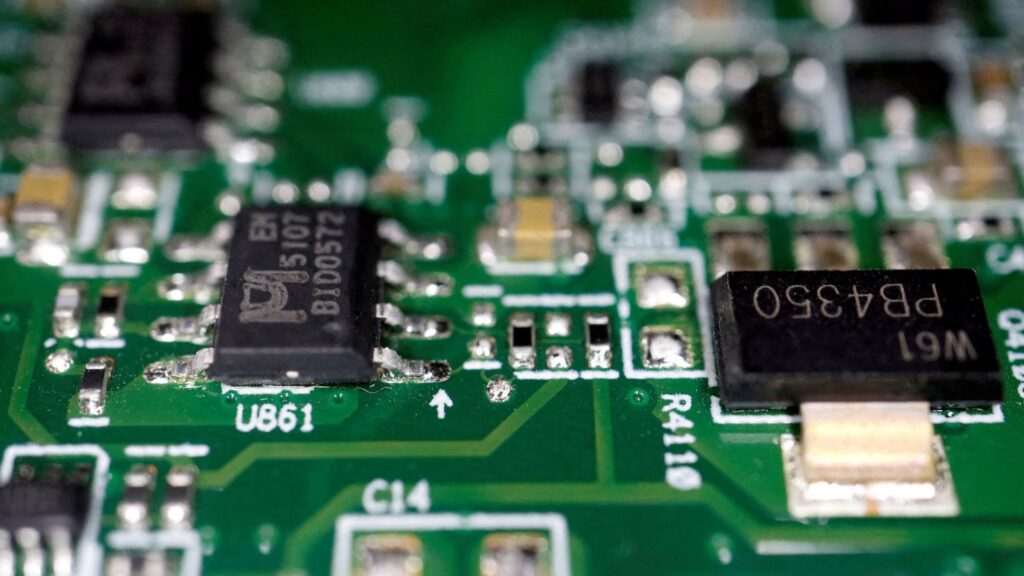image:cnn.com
China has discreetly scaled back steep retaliatory tariffs—previously as high as 125%—on certain U.S.-made semiconductors, according to information shared with CNN by three import agencies in Shenzhen, a major technology hub. This move, which hasn’t been officially publicized, appears to be part of Beijing’s broader effort to shield its critical tech sector from the impacts of an ongoing trade war with the United States.
The import agencies revealed on Thursday that specific integrated circuits, commonly referred to as microchips or semiconductors, are now exempt from the previously imposed tariffs. These exemptions came to light only through customs clearance procedures, suggesting they were implemented quietly without a formal government announcement.
The policy shift follows a sharp escalation in the trade conflict earlier this month. On April 12, China hiked tariffs on all U.S. imports to 125% in retaliation for former U.S. President Donald Trump’s decision to increase duties on Chinese goods to 145%.
Despite a public stance of resilience and self-reliance, Beijing’s unannounced tariff relief hints at an underlying need to maintain access to high-tech components it currently cannot manufacture domestically or source easily from other countries. In addition to semiconductor exemptions, China has also waived tariffs on specific aviation components such as aircraft engines and landing gear, according to an industry executive.
Semiconductors are essential to virtually all modern electronics but require advanced manufacturing capabilities, making them difficult and expensive to produce. While China has made progress in chip development, the nation remains heavily reliant on imports from countries like the U.S., Taiwan, South Korea, Japan, and the Netherlands. In 2023, China imported $11.7 billion worth of chips from the United States alone.
Duncan Clark, chairman of the tech investment advisory firm BDA, commented that the exemption reveals China’s current lack of full independence in chip manufacturing. “There’s ambition for chip autonomy, but it’s going to take time,” he said.
Ray Wang, a U.S.-based analyst specializing in China-U.S. tech competition, noted that this policy reversal benefits American semiconductor giants such as Intel, Texas Instruments, and Global Foundries, which would have been impacted by high Chinese tariffs.
Interestingly, Chinese authorities have yet to acknowledge the tariff changes publicly. Customs officials in Shenzhen and Zhongshan, as well as the General Administration of Customs, denied awareness of the exemptions when contacted. A Foreign Ministry spokesperson also stated they were not familiar with the matter.
According to Chen Shaoling, a manager at import agency Zhengnenliang Supply Chain, the tariff relief applies to eight categories of integrated circuits, excluding memory chips. She discovered the exemptions only after submitting a routine customs declaration. “We had no idea until we filed the paperwork,” she told CNN. “Now the news is spreading fast.”
Caijing, a Chinese business publication, reported on the exemptions citing various tech importers, including one in Shanghai. However, the article was pulled offline just hours after publication.
This is not the first time Beijing has taken quiet steps to support its domestic tech industry. Earlier in April, China eliminated tariffs on semiconductors designed by U.S. companies but manufactured outside the United States—such as those from Nvidia, which are produced in Taiwan by TSMC.
The China Semiconductor Industry Association clarified that tariffs apply based on the country of manufacture, not design origin. This clarification allows U.S. chipmakers with overseas production to bypass the 125% levy.
The current exemptions appear limited to logic chips—used to process and manage data—which are predominantly produced by American companies. Memory chips, mainly supplied by South Korean firms like Samsung and SK Hynix, are not included in this round of tariff relief.
Local customs offices in Shenzhen have reportedly notified select companies of the update. Shenzhen HJET Supply Chain shared an update on its official social media, confirming that eight semiconductor tariff codes had been removed from the additional duties list, effectively reducing their tariffs to zero.
An HJET staff member told CNN the company received confirmation from customs officials about the exemptions on Thursday. Another semiconductor importer, Taihang Semiconductor, also confirmed receiving notice but declined to offer details.
Beyond semiconductors, China is also easing tariffs in other critical industries. Olivier Andries, CEO of French aviation manufacturer Safran, said that as of Thursday evening, China had exempted various aircraft parts—including engines and nacelles—from its reciprocal tariffs. Safran is a key supplier to China’s aviation sector, particularly for the domestically developed C919 airliner.
Reuters further reported that Beijing is actively encouraging businesses to identify other goods that could qualify for tariff exemptions amid efforts to stabilize trade and supply chains.
This move comes as both China and the United States remain entrenched in a high-stakes trade standoff that has rattled global markets, disrupted manufacturing pipelines, and raised fears of a broader economic slowdown.
On April 11, Trump made a similar exemption for electronics like smartphones and laptops, a move that significantly benefited U.S. tech firms like Apple, which assemble many of their products in China.
More recently, Trump has taken a softer tone, suggesting that the harsh tariffs on Chinese goods might be eased and promising to adopt a more conciliatory approach in future negotiations—if Beijing agrees to come to the table.
However, Chinese officials have rejected suggestions that trade talks are ongoing and reiterated that tariff removal must precede any negotiations. “There have been no negotiations between China and the United States on the issue of tariffs,” said Foreign Ministry spokesperson Guo Jiakun. “The U.S. should not mislead the public.”
Guo’s comments came after Trump claimed his administration had held discussions with Chinese officials earlier that day.
